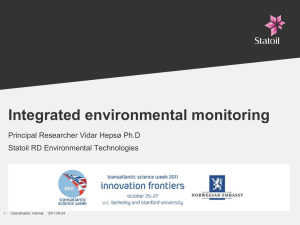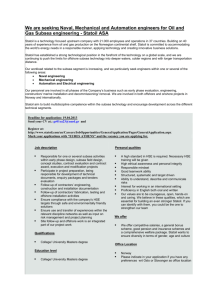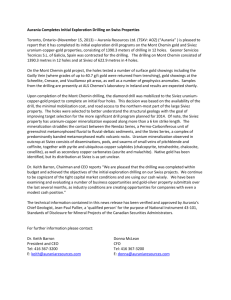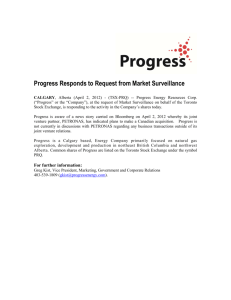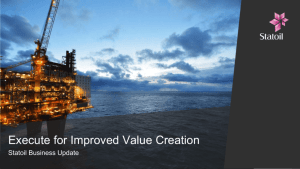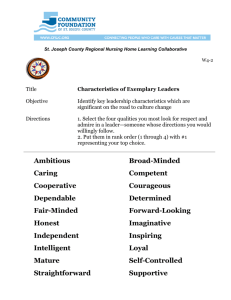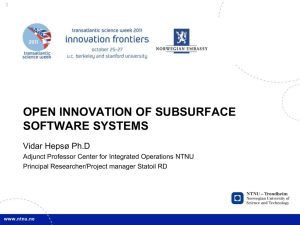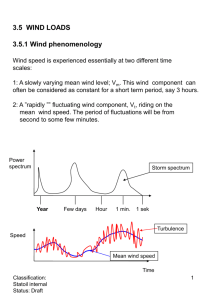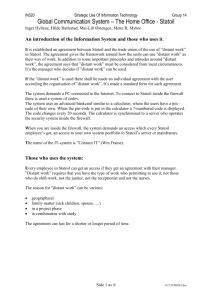Statoil update: Bank of America Global Energy Conference
advertisement
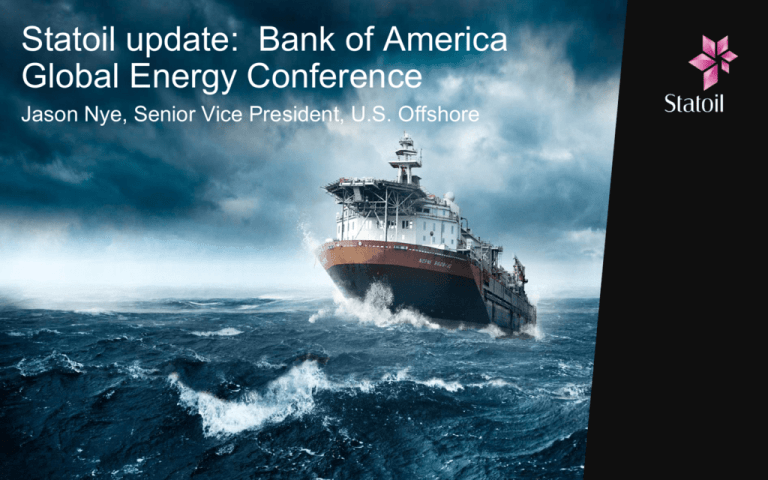
Statoil update: Bank of America Global Energy Conference Jason Nye, Senior Vice President, U.S. Offshore Classification: Internal ©Statoil ASA 2012-10-24 Forward looking statements This report contains certain forward-looking statements that involve risks and uncertainties. In some cases, we use words such as "ambition", "continue", "could", "estimate", "expect", "focus", "likely", "may", "outlook", "plan", "strategy", "will", "guidance" and similar expressions to identify forward-looking statements. All statements other than statements of historical fact, including, among others, statements regarding future financial position, results of operations and cash flows; changes in the fair value of derivatives; future financial ratios and information; future financial or operational portfolio or performance; future market position and conditions; business strategy; growth strategy; future impact of accounting policy judgments; sales, trading and market strategies; research and development initiatives and strategy; market outlook and future economic projections and assumptions; competitive position; projected regularity and performance levels; expectations related to our recent transactions and projects, such as the discovery in Tanzania, the Rosneft cooperation, developments at Johan Sverdrup, the Wintershall agreement, the Ormen Lange redetermination, the farming down of interests in Mozambique and the sale of producing assets in the Gulf of Mexico; completion and results of acquisitions, disposals and other contractual arrangements; reserve information; future margins; projected returns; future levels, timing or development of capacity, reserves or resources; future decline of mature fields; planned maintenance (and the effects thereof); oil and gas production forecasts and reporting; domestic and international growth, expectations and development of production, projects, pipelines or resources; estimates related to production and development levels and dates; operational expectations, estimates, schedules and costs; exploration and development activities, plans and expectations; projections and expectations for upstream and downstream activities; oil, gas, alternative fuel and energy prices; oil, gas, alternative fuel and energy supply and demand; natural gas contract prices; timing of gas off-take; technological innovation, implementation, position and expectations; projected operational costs or savings; projected unit of production cost; our ability to create or improve value; future sources of financing; exploration and project development expenditure; effectiveness of our internal policies and plans; our ability to manage our risk exposure; our liquidity levels and management; estimated or future liabilities, obligations or expenses and how such liabilities, obligations and expenses are structured; expected impact of currency and interest rate fluctuations; expectations related to contractual or financial counterparties; capital expenditure estimates and expectations; projected outcome, objectives of management for future operations; impact of PSA effects; projected impact or timing of administrative or governmental rules, standards, decisions, standards or laws (including taxation laws); estimated costs of removal and abandonment; estimated lease payments, gas transport commitments and future impact of legal proceedings are forward-looking statements. You should not place undue reliance on these forward-looking statements. Our actual results could differ materially from those anticipated in the forward-looking statements for many reasons. 2 These forward-looking statements reflect current views about future events and are, by their nature, subject to significant risks and uncertainties because they relate to events and depend on circumstances that will occur in the future. There are a number of factors that could cause actual results and developments to differ materially from those expressed or implied by these forward-looking statements, including levels of industry product supply, demand and pricing; price and availability of alternative fuels; currency exchange rate and interest rate fluctuations; the political and economic policies of Norway and other oil-producing countries; EU directives; general economic conditions; political and social stability and economic growth in relevant areas of the world; the sovereign debt situation in Europe; global political events and actions, including war, terrorism and sanctions; security breaches; situation in Ukraine; changes or uncertainty in or non-compliance with laws and governmental regulations; the timing of bringing new fields on stream; an inability to exploit growth or investment opportunities; material differences from reserves estimates; unsuccessful drilling; an inability to find and develop reserves; ineffectiveness of crisis management systems; adverse changes in tax regimes; the development and use of new technology; geological or technical difficulties; operational problems; operator error; inadequate insurance coverage; the lack of necessary transportation infrastructure when a field is in a remote location and other transportation problems; the actions of competitors; the actions of field partners; the actions of governments (including the Norwegian state as majority shareholder); counterparty defaults; natural disasters and adverse weather conditions, climate change, and other changes to business conditions; an inability to attract and retain personnel; relevant governmental approvals (including in relation to the agreement with Wintershall); industrial actions by workers and other factors discussed elsewhere in this report. Additional information, including information on factors that may affect Statoil's business, is contained in Statoil's Annual Report on Form 20-F for the year ended December 31, 2013, filed with the U.S. Securities and Exchange Commission, which can be found on Statoil's website at www.statoil.com. Although we believe that the expectations reflected in the forward-looking statements are reasonable, we cannot assure you that our future results, level of activity, performance or achievements will meet these expectations. Moreover, neither we nor any other person assumes responsibility for the accuracy and completeness of the forward-looking statements. Unless we are required by law to update these statements, we will not necessarily update any of these statements after the date of this report, either to make them conform to actual results or changes in our expectations. Our growing international presence Production by region (estimate) Norway North America International 3 NORTH AMERICA Competitively positioned in key petroleum plays Statoil’s portfolio Chukchi Sea 1. East Coast Canada 2. Deepwater Gulf of Mexico Anchorage Leismer and Corner Calgary Offshore Newfoundland Williston St. Johns Bakken 3. US onshore Stamford Marcellus Washington D.C. 4. Canadian oil sands Austin Eagle Ford 5. New exploration opportunities Houston Gulf of Mexico South Riding Point Terminal Grand Bahamas Mexico City 6. Midstream value adding positions 4 Statoil office Statoil asset US OFFSHORE The current Development & Production Portfolio United States Spiderman Anadarko 18.3% Stampede Tahiti Hess 25% 2018 Chevron 25% Heidelberg Anadarko 12% 2016 Vito Caesar Tonga Shell 30% 2020 Anadarko 23.55% Julia XOM 50% 2016 Big Foot Jack CVX 25% 2014 CVX 27.5% 2015 Execution phase St. Malo CVX 21.5% 2014 5 Definition phase Production Big BigFoot Foot Heidelberg Jack – St.spar, MaloPort Aransas, TX October 30, 2014 6 Jack-St. Malo Heidelberg Maersk Developer Important technology for deepwater GOM Drilling safer, faster wells Reduced cost per well drainage point Reduced drilling costs Electronic submersible pumps (ESPs) Water and gas injection 7 Higher oil recovery ESP image Top quartile drilling performance in deepwater 300 250 +54% Ft/day 200 150 +64% 100 50 0 Tucker-1 Krakatoa-1 Kiwi-1 Logan-1 Cobra-1 Kilchurn Bioko Candy Bars • Perfect Well Concept, Drill Well On Paper, Standardization • Harmonized Technical Requirements to U.S. regulations • Use of New Technology − ECD-M, Safekick • Performance Based Contracts 8 Logan-2 Martin Pursuing high quality prospects Chukchi Sea • 55 leases • Evaluation mode Gulf of Mexico • +270 leases • 8th largest lease holder in GOM East Coast Canada • Significant land position • 18 month drilling program starting this fall • The program will focus on both appraising the Bay du Nord discovery, as well as drilling new exploration prospects 9 Gulf of Mexico – drilling top tier opportunities • Broad-based portfolio • Testing a range of plays • Hunting for elephants -deepwater impact discoveries • 8th largest lease holder in GoM • Leveraging experience through play-based approach 10 East Coast Canada: opening up extensive new oil play • Bay du Nord – breakthrough oil discovery (300-600 mmbbl) • Significant running room with several prospects mapped • Drilling campaign from 3Q 2014 with West Hercules • Assessing feasibility of accelerated development 11 Mexico: the next energy frontier Round 1 opportunities • 2001: Statoil established Mexico City office • 2002: Statoil-Pemex MoU signed (renewed in 2013) • 2014: Energy reform (21 Secondary Laws) signed into law (August 11). • 2015: Round 1 − 169 open area blocks: • 109 exploration • 60 production − 10 JV farm-ins to Pemex Statoil reviewing relevant oil and liquidsrich opportunities 12 Source: SENER Summary • Large presence across North America • Attractive offshore portfolio – high value barrels growth • Applying technology to save costs, improve efficiency • Substantial exploration potential • Mexico – the next energy frontier Q A
